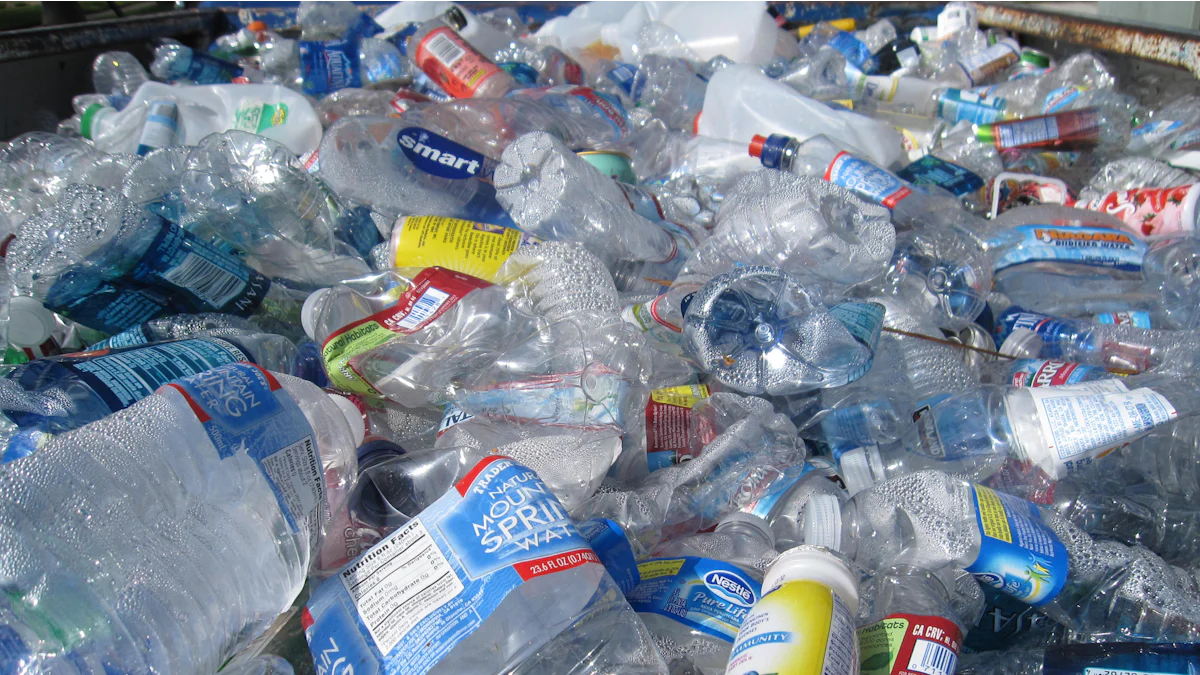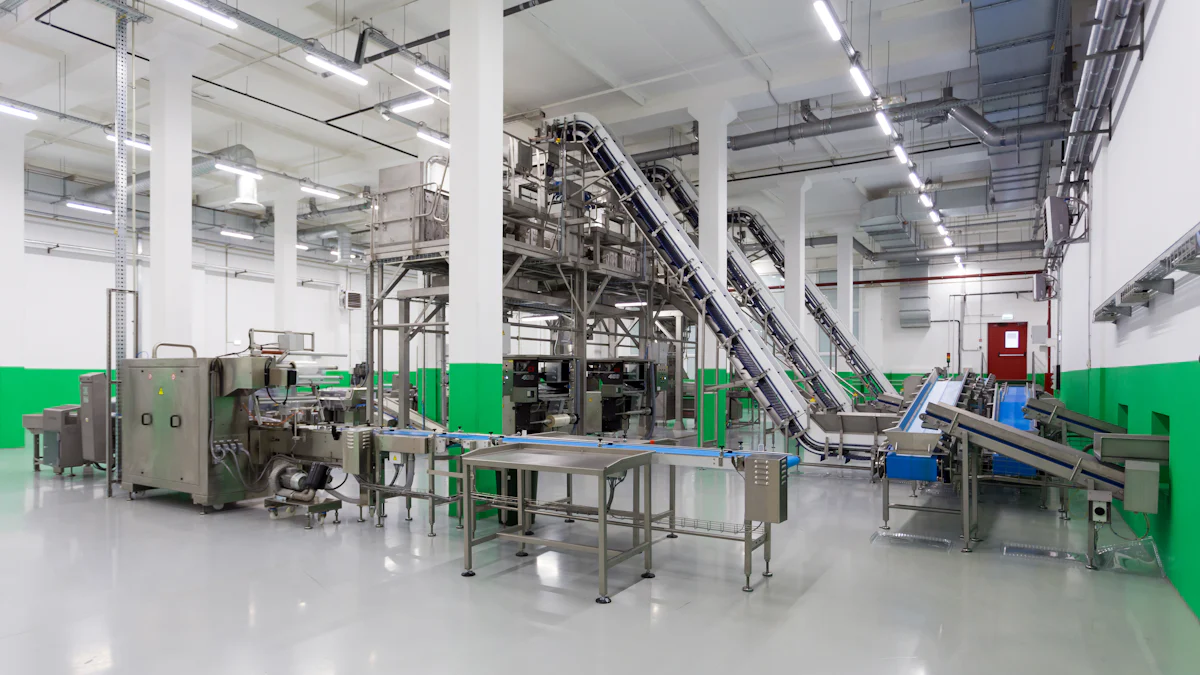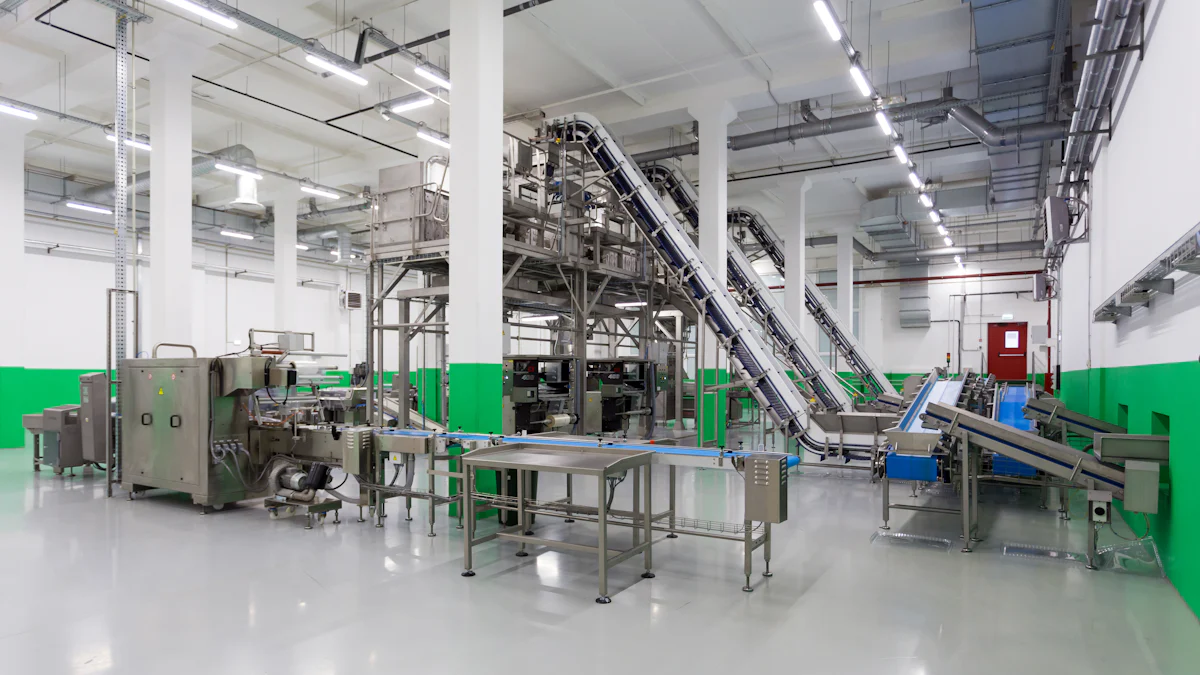Plastic recycling plays a crucial role in addressing the global waste crisis. The U.S. recycles only 5% to 6% of its 40 million tons of plastic waste. Machines significantly enhance the efficiency of the recycling process. Plastic Recycling Machine innovations include advanced sorting, cleaning, and processing technologies. These advancements produce higher-quality recycled plastic. Companies like KraussMaffei Group and ACERETECH Machinery lead in providing high-performance recycling equipment.
Plastic Recycling Machine: Shredders

Function and Importance of Shredders
Plastic Recycling Machine shredders play a critical role in the recycling process. Shredders break down large plastic waste into smaller, manageable pieces. This step is essential for efficient further processing.
Types of Shredders
Several types of shredders exist in the market:
- Single Shaft Shredders: These shredders use a single rotating shaft to cut plastic waste.
- Dual Shaft Shredders: These shredders feature two rotating shafts for enhanced cutting efficiency.
- Four Shaft Shredders: These shredders provide superior shredding capabilities with four rotating shafts.
Key Features of Shredders
Key features of Plastic Recycling Machine shredders include:
- Powerful Motors: Motors ensure efficient operation and longevity.
- Durable Blades: Blades handle tough plastic materials without frequent replacement.
- Energy Efficiency: Energy-efficient designs reduce operational costs and environmental impact.
Applications in Recycling
Industrial Use
In industrial settings, Plastic Recycling Machine shredders handle large volumes of plastic waste. Companies like Vecoplan and ACERETECH offer high-performance shredders designed for industrial use. These machines efficiently process various plastic materials, contributing to sustainable waste management.
Small-Scale Use
For small-scale operations, Plastic Recycling Machine shredders provide an effective solution. Dual shaft shredders, for instance, are ideal for breaking down materials for further processing. These machines offer versatility and reliability for smaller recycling facilities.
Plastic Recycling Machine: Granulators
Function and Importance of Granulators
Granulators play a crucial role in the plastic recycling process. These machines further reduce the size of shredded plastic, converting it into fine granules. This step ensures uniformity in the recycled material, making it easier to process into new products. Plastic Recycling Machine granulators contribute significantly to waste management by transforming plastic waste into reusable materials.
Types of Granulators
Several types of Plastic Recycling Machine granulators exist:
- Central Granulators: Designed for high-volume processing, these granulators handle large plastic pieces efficiently.
- Beside-the-Press Granulators: Positioned next to molding machines, these granulators process scrap directly from production lines.
- Low-Speed Granulators: Operate at slower speeds, reducing noise and dust generation while processing plastics.
Key Features of Granulators
Key features of Plastic Recycling Machine granulators include:
- Robust Construction: Ensures durability and long-term operation.
- Adjustable Blades: Allows for precise control over granule size.
- Safety Mechanisms: Protects operators and prevents accidents during operation.
Applications in Recycling
Industrial Use
In industrial settings, Plastic Recycling Machine granulators handle substantial volumes of plastic waste. Companies like Rapid Granulator and Cumberland provide high-performance granulators designed for industrial applications. These machines efficiently process various plastic materials, contributing to sustainable waste management.
Small-Scale Use
For small-scale operations, Plastic Recycling Machine granulators offer an effective solution. Beside-the-press granulators, for example, are ideal for processing scrap directly from production lines. These machines provide versatility and reliability for smaller recycling facilities.
Plastic Recycling Machine: Extruders
Function and Importance of Extruders
Plastic Recycling Machine extruders play a pivotal role in the recycling process. These machines convert plastic granules into high-quality pellets. This transformation is essential for creating reusable materials. Plastic Recycling Machine extruders streamline the recycling process, enhancing efficiency and output quality.
Types of Extruders
Several types of Plastic Recycling Machine extruders exist:
- Single-Screw Extruders: Efficient for handling low to medium volumes of plastic. These extruders are suitable for various plastic types, including PE and PP.
- Double-Screw Extruders: Enhance processing efficiency for high-volume operations. These extruders are ideal for recycling centers and large-scale facilities.
- Repro-Flex Extruders: Integrate cutting, extrusion, and pelletizing in one step. These extruders can reprocess PE/PP film, pre-crushed PP raffia, and rigid regrind.
Key Features of Extruders
Key features of Plastic Recycling Machine extruders include:
- Versatility: Capable of handling various plastics such as PET, HDPE, and PP.
- Energy Efficiency: Designs focus on sustainability, reducing power consumption while maintaining high output quality.
- Integrated Systems: Some models, like Repro-Flex, combine multiple processes into one machine, streamlining operations.
Applications in Recycling
Industrial Use
In industrial settings, Plastic Recycling Machine extruders handle substantial volumes of plastic waste. Companies like EREMA provide high-performance extruders designed for industrial applications. These machines efficiently process various plastic materials, contributing to sustainable waste management.
Small-Scale Use
For small-scale operations, Plastic Recycling Machine extruders offer an effective solution. Single-screw extruders, for example, are ideal for handling low to medium volumes of plastic. These machines provide versatility and reliability for smaller recycling facilities.
Plastic Recycling Machine: Washers
Function and Importance of Washers
Plastic Recycling Machine washers play a vital role in the recycling process. These machines clean plastic waste, removing contaminants such as dirt, food, oils, and greases. Clean plastic waste ensures high-quality recycled material. Plastic Recycling Machine washers automate and streamline the recycling process, enhancing overall efficiency.
Types of Washers
Several types of Plastic Recycling Machine washers exist:
- Friction Washers: Use high-speed rotating blades to scrub plastic waste.
- Hot Wash Systems: Utilize heated water to remove stubborn contaminants.
- Float-Sink Tanks: Separate plastics based on density differences, ensuring thorough cleaning.
Key Features of Washers
Key features of Plastic Recycling Machine washers include:
- High-Speed Blades: Ensure effective scrubbing and contaminant removal.
- Temperature Control: Maintains optimal water temperature for cleaning.
- Density Separation: Efficiently separates different types of plastics.
Applications in Recycling
Industrial Use
In industrial settings, Plastic Recycling Machine washers handle large volumes of plastic waste. Companies like KraussMaffei Group provide high-performance washing lines designed for industrial applications. These machines efficiently clean various plastic materials, contributing to sustainable waste management.
Small-Scale Use
For small-scale operations, Plastic Recycling Machine washers offer an effective solution. Friction washers, for example, are ideal for smaller recycling facilities. These machines provide versatility and reliability for thorough cleaning of plastic waste.
Plastic Recycling Machine: Pelletizers

Function and Importance of Pelletizers
Plastic Recycling Machine pelletizers play a crucial role in the recycling process. Pelletizers chop and melt plastic material into small pellets. These pellets serve as raw material for manufacturing new plastic products. The global market for Plastic Recycling Machine pelletizers is growing due to the increasing demand for recycled plastic products.
Types of Pelletizers
Several types of Plastic Recycling Machine pelletizers exist:
- Strand Pelletizing Systems: These systems cool the plastic melt in a water bath, solidifying it before air knives pelletize the material.
- Underwater Pelletizers: These machines pelletize plastic directly underwater, which cools and solidifies the pellets instantly.
- Dry Cut Pelletizers: These pelletizers cut the plastic strands without using water, suitable for materials that do not require cooling.
Key Features of Pelletizers
Key features of Plastic Recycling Machine pelletizers include:
- High Efficiency: Advanced technology ensures efficient pelletizing with minimal waste.
- Versatility: Capable of processing various plastics such as HDPE, LDPE, PP, and PET.
- Durability: Constructed with high-grade materials for long-lasting performance.
Applications in Recycling
Industrial Use
In industrial settings, Plastic Recycling Machine pelletizers handle substantial volumes of plastic waste. Companies like MAAG offer high-performance pelletizing systems designed for industrial applications. These machines efficiently process various plastic materials, contributing to sustainable waste management.
Small-Scale Use
For small-scale operations, Plastic Recycling Machine pelletizers provide an effective solution. Machines like those from JianTai offer versatility and reliability for smaller recycling facilities. These pelletizers ensure efficient processing of plastic waste into reusable pellets.
Plastic recycling machines play a vital role in waste management. Each machine, from shredders to pelletizers, contributes uniquely to the recycling process.
- Shredders: Break down large plastic waste into manageable pieces.
- Granulators: Convert shredded plastic into fine granules.
- Extruders: Transform granules into high-quality pellets.
- Washers: Clean plastic waste by removing contaminants.
- Pelletizers: Chop and melt plastic into reusable pellets.
These machines enhance recycling efficiency and sustainability. Future trends include innovations in energy efficiency and advanced processing technologies. Companies like Vecoplan and KraussMaffei lead in these advancements.



